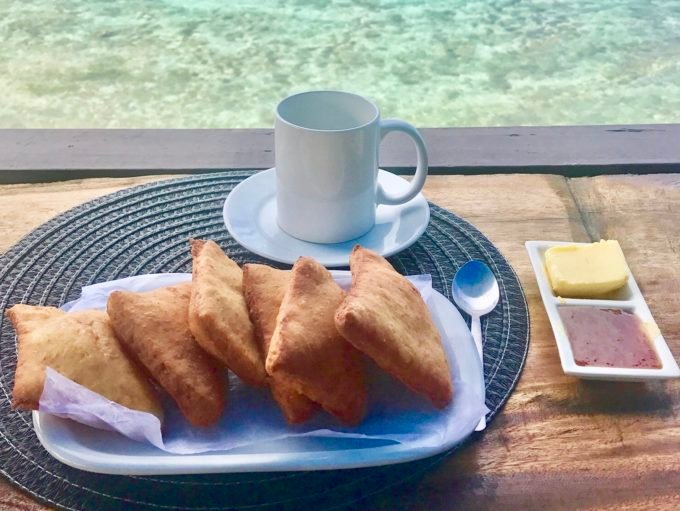
Fried Dough for Breakfast: Fiji Edition

Fried Dough for Breakfast: Fiji Edition
Babakau in Fiji
Tagi Vonolagi walked toward me as I dropped my surfboard onto the white sand.
“How was your surf?” he asked as I squatted down, attempting to catch my breath. Forcing a smile, I said it was really good, great actually. He knew I was lying.
In reality, I was exhausted and rattled by the unexpectedly aggressive reef breaks off Black Rock Beach, a small span of Fiji’s 50-mile Coral Coast. All I wanted to do was ditch my board and rash guard–and find some breakfast.
An affable and athletic 20-something, Vonolagi played host, tour guide, and surf instructor during my stay in Olosara, a small village on the outskirts of Sigatoka. He told me about the area’s fusion of cultures, showed me the best places to fish and watch the sunset, and even extended an invitation to train with his rugby teammates in the Sigatoka Sand Dunes National Park.
As I toweled off, Vonolagi provided one more piece of advice: directions to a good breakfast spot. Minutes later, I was turning my rented Jimny off the Queens Road and into a lot shadowed by a red Coca-Cola billboard with “He-Ni-Uwa Restaurant” painted in white. The building’s timber stilts were perched on a sandy bank, supporting a deck that provided panoramic views of the turquoise South Pacific.
I entered the back and was greeted with a booming “Bula!” by the owner, Apenisa. He shook my hand and guided me to a plastic stool overlooking the water.
Apenisa took the seat next to mine and told me about his restaurant, a multi-year project saved for and built with family and friends. He asked about my home and visit to Sigatoka, before interrupting his own line of questioning.
“You need food. We’ll make you a good Fijian breakfast–babakau.”
Babakau–often referred to as Fijian pancakes or doughnuts–is a fried combination of flour, yeast, and lots of sugar. Like many of Fiji’s multicultural dishes, explanations for the origins of babakau vary depending on who you ask. Given its similarity to gulgula, some attribute its popularity to Indian influences. Some believe it emerged thanks to Chinese immigrants in Suva, while others insist babakau is rooted in 19th-century European colonization.
Its hazy history doesn’t make this breakfast any less popular with Fijians. While visitors are more likely to find American-style pancakes on restaurant menus, in Fijian homes it will be babakau. Recipes can stay in families for generations, each with variations that might include coconut, curries, or other types of fillings.
As I sat enjoying the view, Apenisa reappeared from the kitchen with a heaping plate of babakau, placing it before me with a warning that they were still very hot.
We continued our chat as I smothered each piece with butter and apricot jam. Full of fried dough, I went back to Vonolagi’s home for a post-breakfast nap.
He-Ni-Uwa Restaurant
Queens Road
Sigatoka, Fiji
8 a.m. – 8 p.m (Mon.-Sat.)
10 a.m. – 8 p.m. (Sun.)